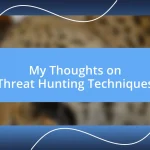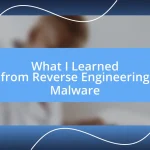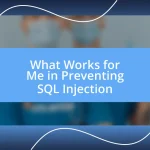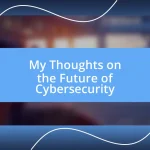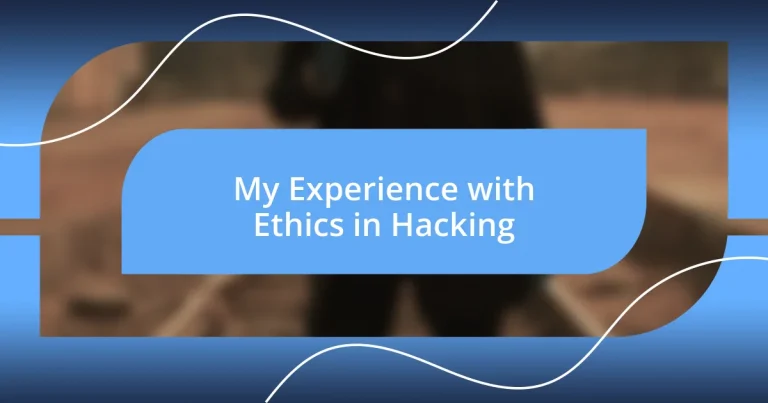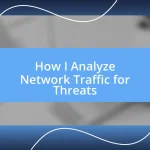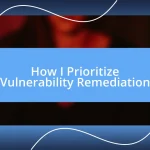Key takeaways:
- Understanding the ethical implications of hacking is essential; true ethical hacking hinges on intent and consent, emphasizing responsibility and trust.
- Engaging with experienced ethical hackers fosters a mindset focused on empathy, continuous learning, and the importance of collaboration in the cybersecurity landscape.
- The evolution of technology presents new challenges and opportunities for ethical hackers, who must balance their skills with a commitment to ethical decision-making in an increasingly complex digital world.
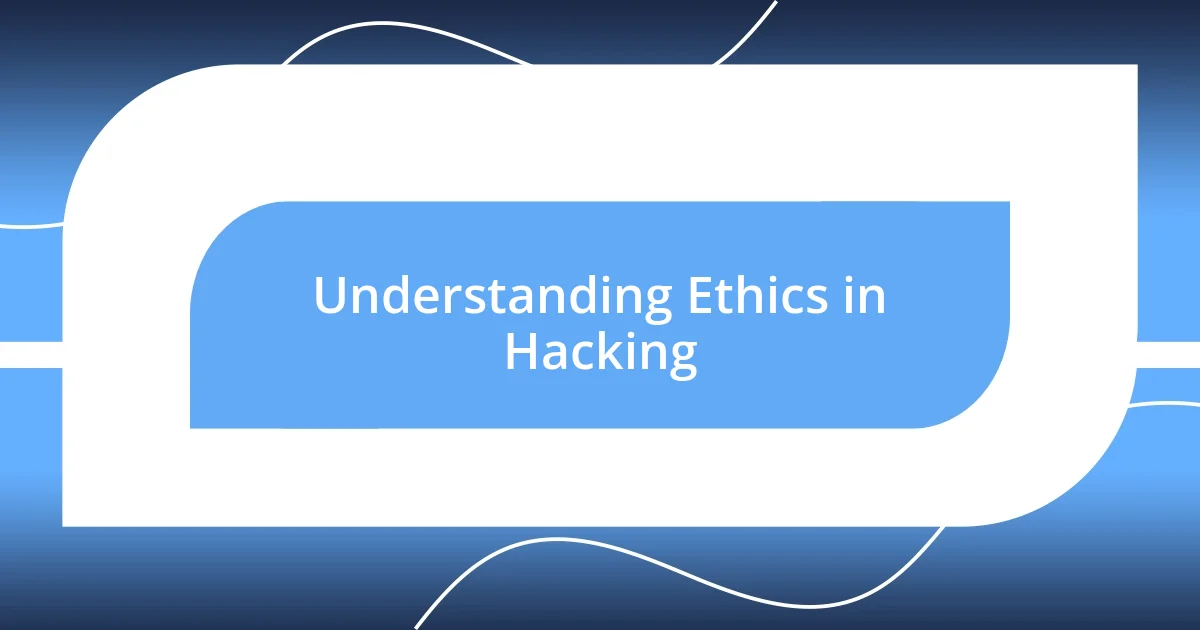
Understanding Ethics in Hacking
When I first entered the world of hacking, I was struck by the complexity of ethical considerations. It made me ponder: can one truly separate hacking skills from moral implications? I found that the distinction between ethical hackers and malicious hackers often boils down to intent and consent, which can sometimes feel murky.
I remember a time when I was part of a team that conducted penetration testing for a local business. We were given permission to probe their systems for vulnerabilities. That moment was eye-opening for me; I felt the weight of responsibility, knowing our findings could either protect or potentially harm their digital environment. This experience underscores that ethical hacking isn’t just about technical skills—it’s about understanding the trust placed in us.
In the hacking community, I’ve noticed that discussions about ethics often evoke passionate reactions. Some believe the ends justify the means, while others staunchly uphold a code of conduct. How do we navigate these differing perspectives? Personally, I’ve learned that ethics serve as a compass guiding our actions, shaping not just what we do, but who we become in the realm of technology.
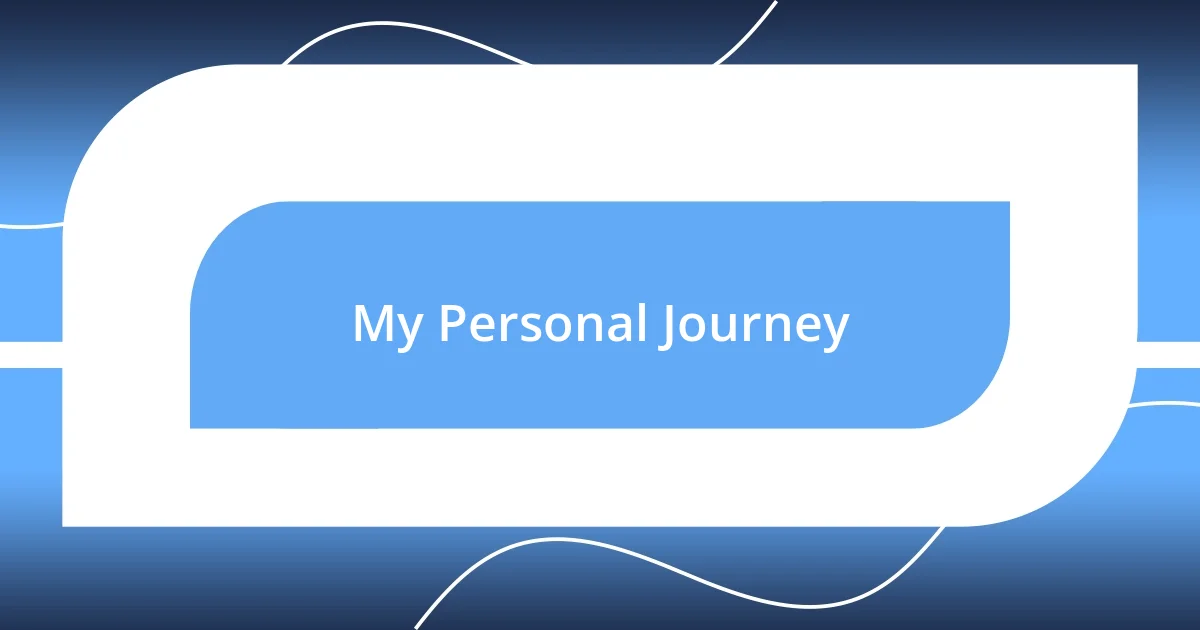
My Personal Journey
As I progressed through my hacking journey, I frequently encountered situations that challenged my ethical boundaries. There was a point when I was offered a lucrative contract that involved exploiting a known vulnerability in a widely used application. The more I thought about it, the more I realized how this could harm countless unsuspecting users. I had to ask myself—was the financial gain worth potentially jeopardizing people’s trust?
During my time at a cybersecurity conference, I had a conversation with a renowned ethical hacker who deeply influenced my perspective on the ethics of hacking. He shared his philosophy that the real power of a hacker lies not in their ability to break systems but rather in their capacity to educate and empower others. That interaction sparked a sense of duty within me, reinforcing my belief that the impact of our choices goes beyond the immediate moment and shapes the future of our industry.
Reflecting on my experiences, I now recognize that ethics in hacking isn’t just a code to follow but a personal journey of growth. I’ve stumbled, learned, and evolved, and I believe the journey never truly ends. Each project and every interaction adds layers to my understanding of responsibility, and I can genuinely say that I’m not just a hacker; I’m a custodian of trust in a digital world.
| Experience | Insight Gained |
|---|---|
| Penetration Testing Project | Understanding the weight of responsibility |
| Discussion with Renowned Hacker | Power of education and empowerment |
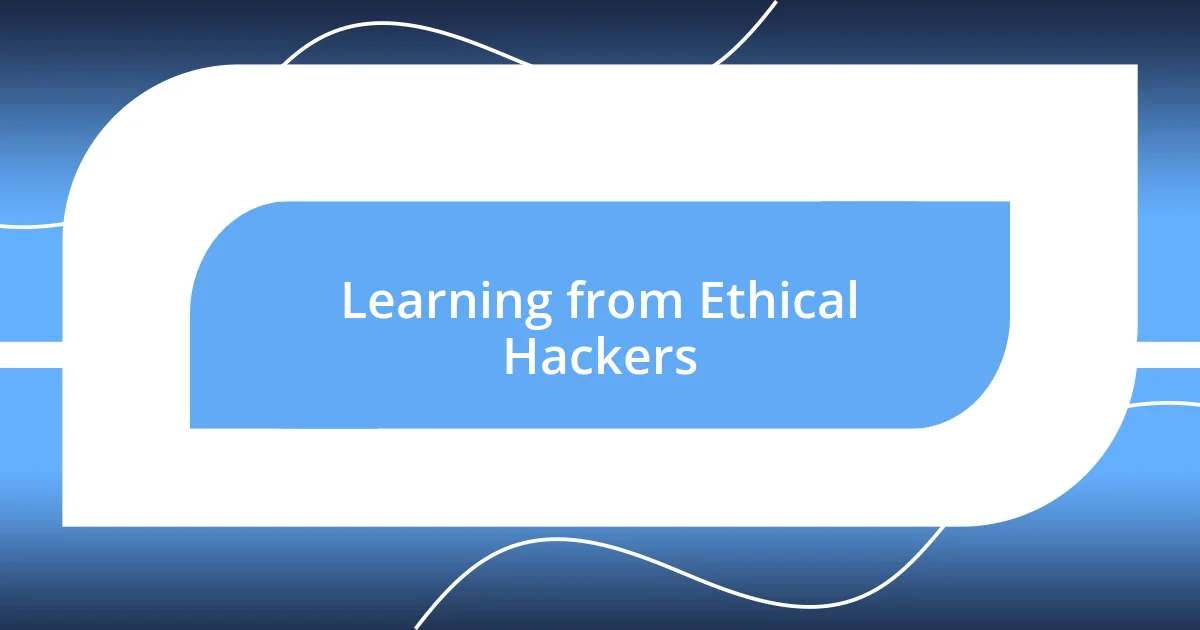
Learning from Ethical Hackers
Learning from ethical hackers has profoundly impacted my approach to cybersecurity. I recall attending a workshop led by an ethical hacker who demonstrated real-world scenarios of security breaches. Watching him dissect what went wrong not only highlighted technical vulnerabilities but also underscored the human elements involved. I walked away realizing that understanding ethics is just as crucial as mastering hacking tools; it’s about safeguarding people, not just systems.
Ethical hacking teaches essential lessons that extend beyond technical prowess. I often reflect on a few key takeaways from seasoned ethical hackers in the field:
- Empathy is Key: Understanding the potential impact of your actions on real users fosters a sense of responsibility.
- Continuous Learning: The cyber landscape evolves rapidly; ongoing education ensures you stay aware of ethical standards and best practices.
- Collaboration is Crucial: Engaging with other professionals helps establish a supportive environment where ethical discussions flourish.
- Intent Matters: Always question the purpose behind your actions—good intentions can sometimes lead to harmful outcomes.
Learning from these professionals has fundamentally shaped my mindset, reminding me that ethical considerations should be at the forefront of every decision we make in the digital world.
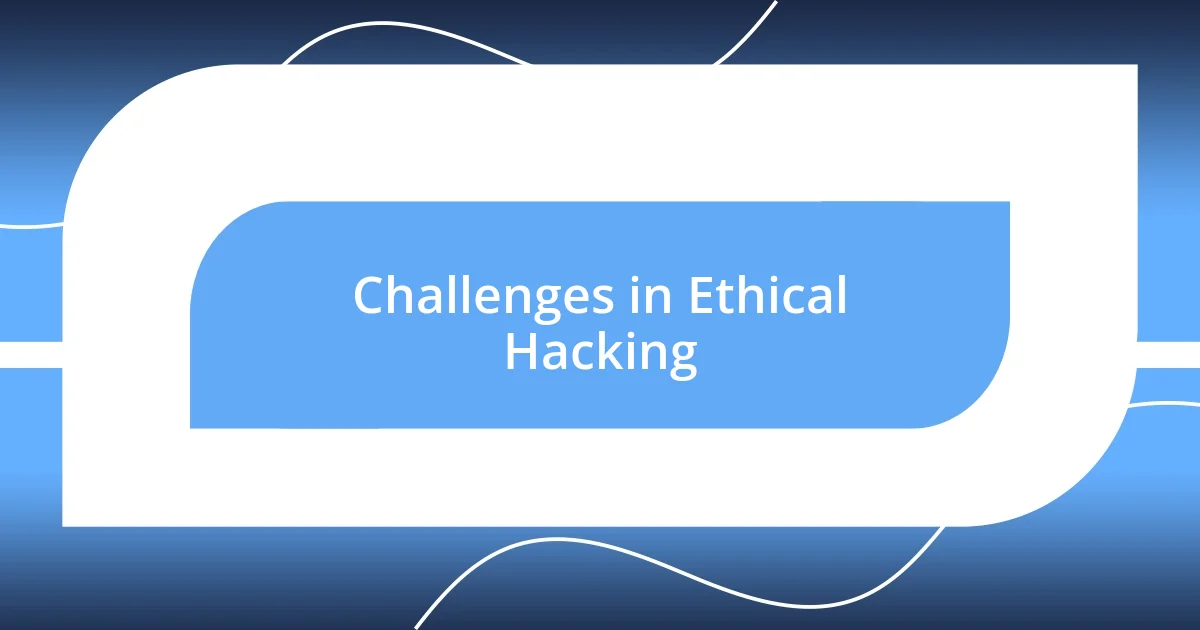
Challenges in Ethical Hacking
Navigating the ethical landscape in hacking can be fraught with dilemmas. I recall working on a project where we discovered a serious vulnerability that could have been exploited for personal gain. I found myself grappling with the decision of whether to report it to the company or take advantage of it. That moment made me question my integrity and the long-term repercussions of my choices. Isn’t it fascinating how one decision can shape our moral compass?
Another challenge I’ve faced is the difficulty of balancing transparency with confidentiality. During one engagement, I needed to disclose certain findings to my team while ensuring sensitive information was protected. The tension between being open and safeguarding data kept me on my toes. I often wondered: how can we be forthright without compromising the very essence of trust that’s crucial in our field?
Lastly, I’ve experienced pushback from peers who overlook the ethical implications in favor of quick results. I remember participating in a group discussion where an idea was pitched to capitalize on a vulnerability for profit. I spoke up, voicing my concerns. It was an uncomfortable moment, but it reinforced my belief that the hardest conversations often lead to the most impactful changes. Isn’t it essential we challenge the status quo to cultivate a more ethical hacking community?
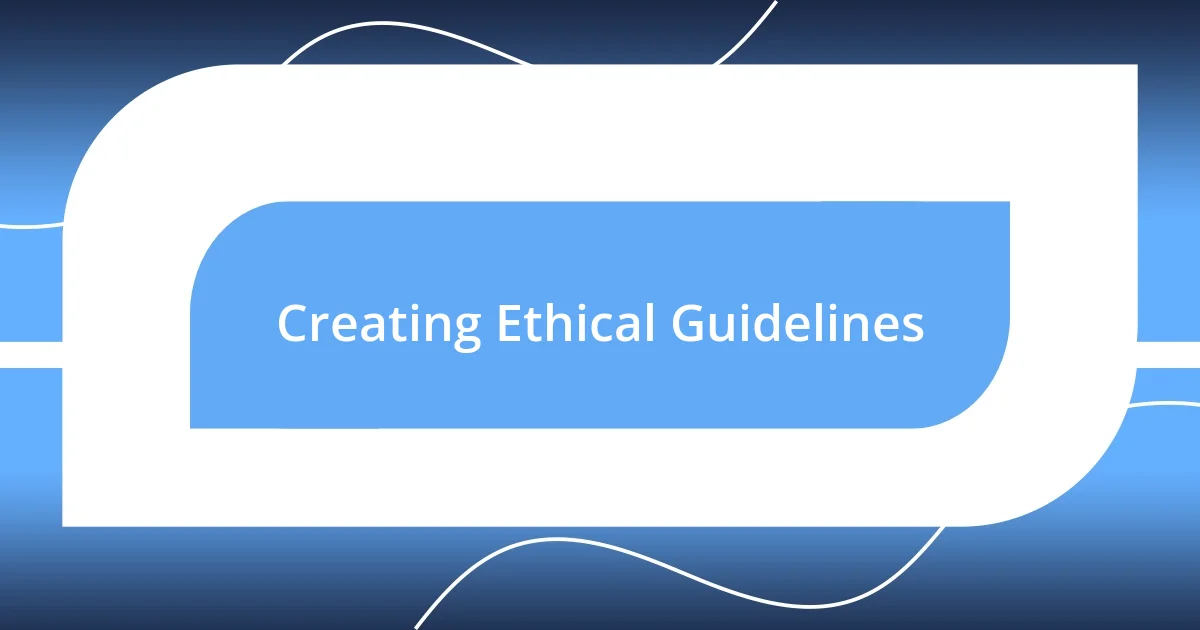
Creating Ethical Guidelines
Creating ethical guidelines in hacking is a nuanced endeavor that requires careful consideration and collaboration. I remember when our team convened to draft a set of principles for our ethical hacking practices. It was fascinating to witness how diverse opinions shaped our guidelines. Each member brought different perspectives, which led us to create a comprehensive framework that emphasized accountability and respect for privacy. How often do we stop to reflect on the collective wisdom that comes from such discussions?
One night, I spent hours thinking about how to formalize our guidelines. I realized we needed to articulate not just rules, but our core values. This meant acknowledging the human element in our work. I can’t stress enough how vital it is to understand the impact of our hacking activities on users’ lives. We defined parameters surrounding consent and communication, making sure that we always prioritize the well-being of individuals over mere technical success. This focus on empathy, I believe, distinguishes ethical hackers from others in the field.
In another instance, while reviewing our drafts, we debated whether to include a clause about the intent behind our actions. It hit me how often the lines blur between ethical and unethical behaviors based on motivation. We ultimately decided to embed this concept in our guidelines, recognizing that intention can significantly influence outcomes. Isn’t it intriguing how our motivations can redefine the stakes in our ethical landscape? It’s a reminder that in our complex digital world, we must always keep asking ourselves: what are we truly trying to achieve?
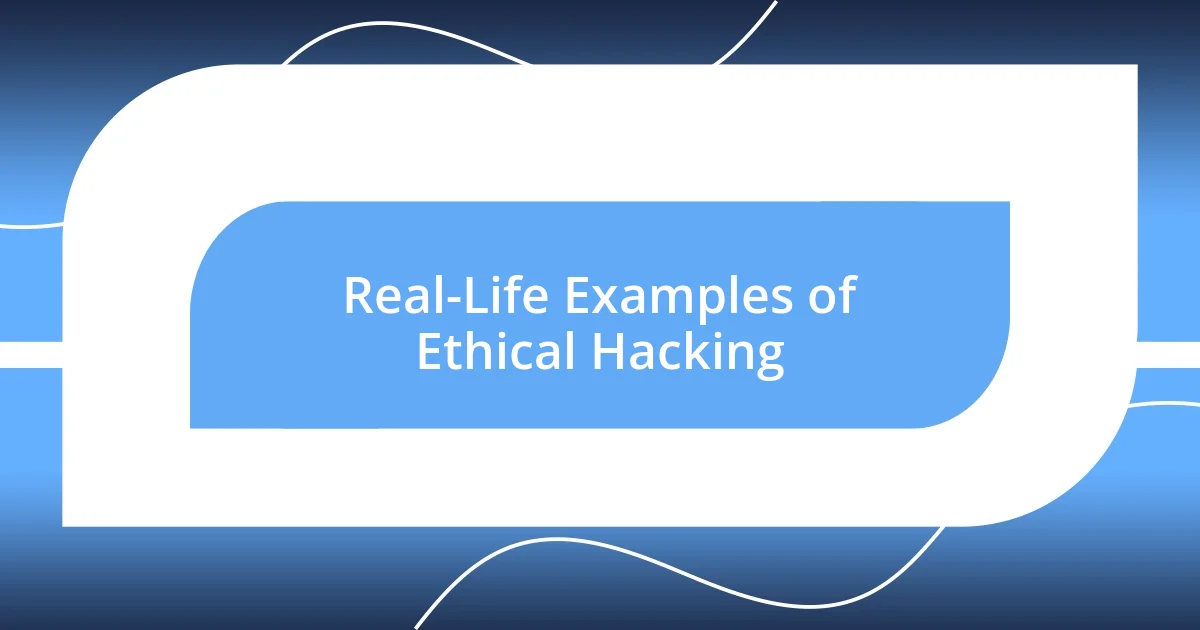
Real-Life Examples of Ethical Hacking
One of the most striking examples of ethical hacking occurred when I worked with a non-profit organization. They contracted our team to test the security of their donation platform, which held sensitive financial information. While conducting the penetration test, we uncovered a significant flaw that could have allowed hackers to siphon off funds unnoticed. This experience not only reinforced my conviction about the importance of ethical hacking but also made me realize how our skills can directly impact the safety of those who trust us with their data. Isn’t it rewarding to know that our vigilance protects those who might not have the resources to safeguard themselves?
Another memorable instance was during a corporate training session. I led a workshop on ethical hacking for new recruits, where I shared a story about a well-known company that had voluntarily exposed itself to hackers through a “bug bounty” program. Participants were amazed to learn that ethical hackers had managed to uncover vulnerabilities that would have cost the company millions in potential breaches. It sparked a lively discussion about the value of transparency and collaboration in cybersecurity. How often do we consider that inviting hacking attempts can actually strengthen an organization’s defenses?
Reflecting on my journey, I often think back to a time when I participated in a community-driven initiative to improve cybersecurity awareness. We collaborated with local schools to teach students about online safety and the role of ethical hackers. Watching young minds light up with curiosity and passion for the field was incredibly fulfilling. It struck me how crucial it is to foster a culture of ethical responsibility at an early age. Can you imagine how different the tech landscape could be if we prioritize ethics in education? It’s these real-life stories that illustrate the profound impact ethical hacking can have not just on organizations but on society as a whole.
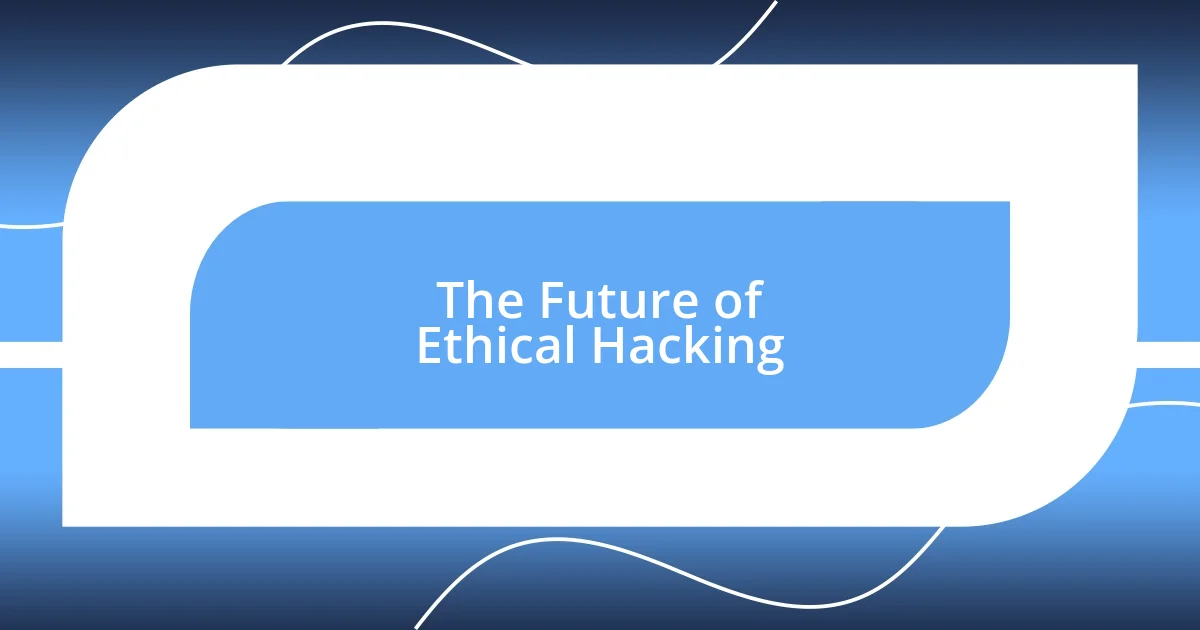
The Future of Ethical Hacking
The future of ethical hacking is incredibly promising, fueled by the relentless evolution of technology. As I look ahead, I see a landscape where ethical hackers play an integral role in shaping a secure digital environment. I can’t help but think about the constant cat-and-mouse game between cybercriminals and defenders. With innovations like AI and machine learning, ethical hackers will have more sophisticated tools at their disposal, enabling them to stay a step ahead. Don’t you think that’s exciting?
I remember when I attended a conference where experts discussed the implications of 5G technology. The emerging connectivity will undoubtedly introduce new challenges, but it also presents ethical hackers with a golden opportunity to lead the charge in securing these networks. I felt a surge of optimism as speakers shared their visions for collaborative security efforts and the importance of building trust between organizations and their ethical hacking teams. Isn’t it inspiring to think about how partnerships can enhance cybersecurity resilience in our interconnected world?
As the demand for cybersecurity professionals continues to grow, I also wonder about the ethical responsibilities that will inevitably expand along with it. What will it mean for the next generation of ethical hackers as they navigate complex moral dilemmas in this ever-changing environment? I suspect they will have to balance the power of their skills with an even stronger commitment to ethical considerations. It makes me curious about how we can instill a deep sense of responsibility in aspiring ethical hackers. Could fostering mentorship programs that emphasize ethical decision-making be a vital piece of the puzzle?

